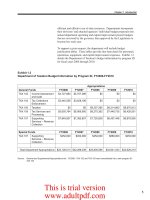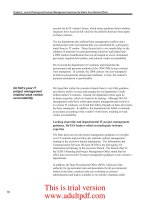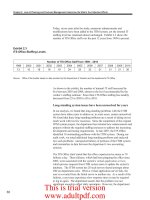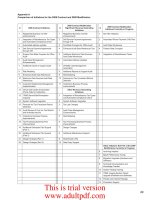chapter 2 The Political, Legal and Technological Environment
Bạn đang xem bản rút gọn của tài liệu. Xem và tải ngay bản đầy đủ của tài liệu tại đây (141.81 KB, 31 trang )
chapter two
The Political, Legal and
Technological Environment
The Political, Legal, and
Technological Environment
Chapter Objectives:
1.
2.
3.
INTRODUCE the basic political systems that
characterize regions and countries around the
world and offer brief examples of each.
PRESENT an overview of the legal and regulatory
environment in which MNCs operate worldwide.
REVIEW key technological developments as well
as their impact on MNCs now and in the future.
Political Environment:
Ideologies (ideas reflecting beliefs and values
influencing behavior/culture of nations and political
systems) underlie the actions of governments.
Evaluate a political system along two dimensions:
(1) rights of citizens based on a system of
government (range democratic to totalitarian); (2)
Focus of political system on individualism vs.
collectivism.
No pure form of government
Democratic tend to emphasize individualism and
totalitarian tends to emphasize collectivism.
(1) Ideologies:
Individualism
People should be free to pursue economic
and political endeavors without constraint.
In business context, similar to capitalism and
connected to free market society
Private property more successful, productive,
and progressive than communal property
Betterment of society related to level of
freedom individuals have in pursuing
economic goals.
(1) Ideologies:
Collectivism
Does not value individual as such
Views needs/goals of society at large as
more important than individual desires
No rigid form of collectivism as societal goals
differ greatly among cultures
e.g.: Fascism: nationalism, authoritarianism,
militarism, corporatism, collectivism,
totalitarianism
(1) Ideologies:
Socialism
Government ownership of institutions
Profit is not the ultimate goal
Can be viewed as moderate example of collectivism
in practice
Has been practiced in China, North Korea, Cuba
Democratic socialism, more moderate form,
practiced by Great Britain’s Labour Party, and in
France, Spain, and Greece
Communism
(2) Political Systems:
Democracy
European roots
System in which government is controlled by
citizens either directly or through elections.
Democratic society cannot exist without at
least a two-party system
Once elected, representative is held
accountable to electorate for actions (which
limits power of government)
(2) Political System:
Totalitarianism
The control of political and human life
The maintenance of power
Others
Political Environment
Regional Example: China
Emerging economic power
Government attempting to open up economy:
Speed up conversion of state enterprises into corporations
Trade liberalization a top priority since joining WTO in 2001
Becoming a more open, democratic society
Greater tolerance of individual freedoms
Worker retraining, low-cost housing and other programs
Seeking to unleash a more dynamic market economy
Political Environment:
Regional Example: Europe
Privatization and economic liberalization
reinforce EU-wide political and economic
integration
Political power is variable and complex
Strong opposition to U.S.-led intervention in
Iraq sometimes spill over into business
relationships and dealings
Europe is a large interwoven region
economically, but contains vast cultural
differences
Political Environment:
Example: The Middle East
In Iran and Saudi Arabia laws and
government based on Islamic principles
Business conduct in Middle East similar to
Western in many ways
Worldwide fallout from war on terrorism have
made business environment there risky and
potentially dangerous
Political Environment:
Example: Russia
Neglect and confusing changes in economic
policy
Infrastructure is weak and a political
quagmire
Corruption interferes with attraction of more
foreign investment
Legal and Regulatory
Environment
Confusion and challenge for the MNC due to
many different laws and regulations in global
business operations
MNCs must carefully evaluate legal
framework in each market before doing
business
Four Global Foundations of
Law:
1.
2.
3.
4.
Islamic
Socialist
Common
Civil or code
Four Global Foundations of Law:
Islamic Law
Derived from interpretation of Qur’an and
teachings of Prophet Muhammad
Found in Islamic countries: Middle East and
Central Asia
Four Global Foundations of Law:
Socialist Law
Origins in Marxist socialist system
Requires most property to be owned by state
or state enterprises
Continues to influence regulations in former
communist countries:
Members of former Soviet Union
Peoples’ Republic of China
Vietnam
North Korea
Cuba
Four Global Foundations of Law:
Common Law
Origins in English law
Foundation of legal system for:
United States
Canada
England
Australia
New Zealand
Four Global Foundations of Law:
Civil or Code Law
Derived from Roman law
Found in non-Islamic and non-socialist
countries:
France
Some Latin American countries
Louisiana in the U.S.
Basic Principles of
International Law
Sovereignty and Sovereign Immunity
International Jurisdiction
Doctrine of Comity
Act of State Doctrine
Treatment and Rights of Aliens
Forum for Hearing and Settling Disputes
Basic Principles of
International Law:
Sovereignty and Sovereign Immunity: An
international principle of law which holds that
governments have the right to rule
themselves as they see fit.
Basic Principles of
International Law:
International Jurisdiction: A jurisdictional
principle of international law which holds that
every country has jurisdiction over its citizens
no matter where they are located
Nationality principle
Territoriality principle
Protective principle
Basic Principles of
International Law:
Doctrine of Comity: A jurisdictional principle
of international law which holds that there
must be mutual respect for the laws,
institutions, and government of other
countries in the matter of jurisdiction over
their own citizens.
Basic Principles of
International Law:
Act of State Doctrine: A jurisdictional
principle of international law which holds that
all acts of other governments are considered
to be valid by the court of the country, even if
such acts are illegal or inappropriate under
that country’s law.
Basic Principles of
International Law:
Treatment and Rights of Aliens: Countries
have the legal right to refuse admission of
foreign citizens and to impose special
restrictions on their conduct, right of travel,
where they can stay, and what business they
may conduct.
Nations can also deport aliens.
Basic Principles of
International Law:
Forum for Hearing and Settling Disputes:
U.S. courts can dismiss cases brought before
them by foreigners; however, they are bound
to examine issues such as:
where the plaintiffs are located
where the evidence must be gathered
where property to be used in restitution is located









